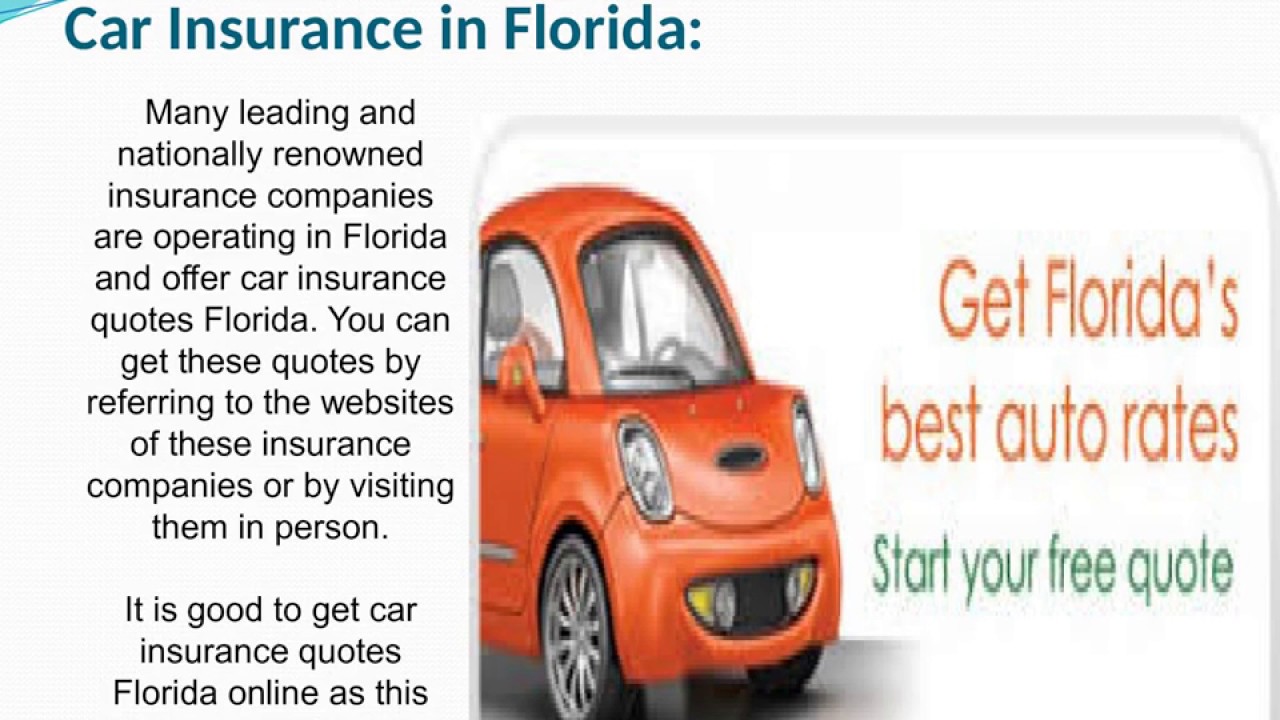Car insurance Florida quote – Navigating the world of car insurance in Florida can be a bit of a maze, especially with the state’s unique no-fault system and mandatory coverage requirements. But don’t worry, we’re here to help you find your way to the best rates and coverage for your needs.
This guide will break down everything you need to know about car insurance in Florida, from understanding the basics to finding the best deals. We’ll cover factors that influence your quote, how to get accurate quotes, and what to expect when you’re ready to choose a policy.
Exploring Car Insurance Options in Florida
Finding the right car insurance policy in Florida can feel overwhelming with so many options available. This guide will break down the different types of car insurance policies available in Florida, their pros and cons, and some reputable insurance providers to help you make an informed decision.
Types of Car Insurance Policies in Florida, Car insurance florida quote
Florida offers a variety of car insurance policies to cater to different needs and budgets. Understanding the differences between these policies can help you find the best fit for your situation.
- Traditional Car Insurance: This is the most common type of car insurance, offering comprehensive coverage for various risks like accidents, theft, and natural disasters. It typically includes liability coverage, collision coverage, and comprehensive coverage.
- Bundled Car Insurance: This type of policy combines car insurance with other types of insurance, such as homeowners or renters insurance, to provide discounts and convenience. Bundling can often lead to lower premiums than purchasing separate policies.
- Usage-Based Car Insurance: This policy uses telematics devices or smartphone apps to track your driving habits, such as mileage, speed, and braking patterns. Your premium is adjusted based on your driving behavior, rewarding safe drivers with lower rates.
Pros and Cons of Different Car Insurance Policies
Each type of car insurance policy has its own advantages and disadvantages, which are summarized below:
| Policy Type | Pros | Cons |
|---|---|---|
| Traditional Car Insurance | Comprehensive coverage, flexibility in customizing coverage | Potentially higher premiums, less customization for specific needs |
| Bundled Car Insurance | Discounts, convenience, potential for lower premiums | Less flexibility in choosing individual policies, may not be the best option for all situations |
| Usage-Based Car Insurance | Potential for lower premiums for safe drivers, personalized driving feedback | Privacy concerns, may not be suitable for drivers who frequently drive in high-risk areas |
Reputable Car Insurance Providers in Florida
Choosing a reliable car insurance provider is crucial for ensuring you have adequate coverage and prompt claims processing. Some reputable car insurance providers in Florida include:
- State Farm: Known for its strong financial stability and extensive network of agents.
- Geico: Offers competitive rates and a user-friendly online experience.
- Progressive: Provides innovative features like usage-based insurance and customizable coverage options.
- Allstate: Offers a wide range of coverage options and a strong reputation for customer service.
- Florida Peninsula Insurance Company: A specialized provider focusing on Florida residents and offering coverage for hurricane damage.
Florida-Specific Car Insurance Considerations

Florida’s car insurance landscape presents unique challenges and considerations for drivers. The state’s high concentration of uninsured motorists, susceptibility to natural disasters, and no-fault insurance system all contribute to a complex insurance environment.
The Impact of Uninsured Motorists
Florida has a significantly higher percentage of uninsured drivers compared to the national average. This poses a substantial risk to insured drivers who may be involved in accidents with uninsured individuals. To mitigate this risk, Florida requires drivers to carry Personal Injury Protection (PIP) coverage, which covers medical expenses regardless of fault.
The Influence of Natural Disasters
Florida’s location makes it highly vulnerable to hurricanes, storms, and other natural disasters. These events can cause widespread damage to vehicles, leading to increased insurance claims and potentially higher premiums. Insurance companies often factor in the risk of natural disasters when setting rates, and drivers in high-risk areas may face higher premiums.
Florida’s No-Fault System
Florida operates under a no-fault insurance system, where drivers are primarily responsible for covering their own medical expenses and lost wages after an accident, regardless of fault. This system aims to streamline claims processing and reduce litigation. However, it can also limit the amount of compensation available to accident victims, especially in cases of serious injuries.
The Role of the Florida Office of Insurance Regulation
The Florida Office of Insurance Regulation (OIR) plays a crucial role in overseeing and regulating the state’s car insurance industry. The OIR is responsible for:
- Ensuring that insurance companies comply with state laws and regulations.
- Approving insurance rates and policies.
- Investigating consumer complaints and resolving disputes.
- Promoting fair and competitive practices within the insurance market.
Car Insurance and Florida’s Driving Laws

Florida’s driving laws are intricately linked to car insurance requirements, creating a system that aims to protect drivers, passengers, and pedestrians. Understanding these laws and their impact on car insurance is crucial for navigating the roads safely and responsibly.
Mandatory Coverage Requirements
Florida mandates specific car insurance coverage for all drivers, ensuring that financial protection is available in case of accidents. These requirements aim to safeguard individuals and property involved in crashes.
- Personal Injury Protection (PIP): This coverage provides medical benefits for injuries sustained in an accident, regardless of fault. It covers up to $10,000 in medical expenses, including doctor visits, hospital stays, and rehabilitation.
- Property Damage Liability (PDL): This coverage protects you financially if you cause damage to another person’s property, such as their vehicle or other assets. The minimum requirement is $10,000.
While these minimum coverage requirements are mandatory, drivers can choose to purchase additional coverage, such as uninsured/underinsured motorist coverage, comprehensive coverage, or collision coverage, to enhance their financial protection.
Penalties for Driving Without Insurance
Driving without the required car insurance in Florida is a serious offense, carrying significant consequences.
- Fines: Driving without insurance can result in a hefty fine of up to $500.
- License Suspension: Your driver’s license may be suspended for up to three years.
- Vehicle Impoundment: Your vehicle can be impounded, leading to additional fees and inconvenience.
- Jail Time: In some cases, driving without insurance can even lead to jail time, particularly if it’s a repeat offense or if the driver is involved in an accident.
These penalties emphasize the importance of maintaining valid car insurance to avoid legal and financial repercussions.
Role of Car Insurance in Resolving Accidents and Disputes
Car insurance plays a crucial role in resolving accidents and disputes in Florida, providing a framework for financial compensation and dispute resolution.
- Financial Compensation: When an accident occurs, car insurance helps cover the costs associated with injuries, property damage, and legal fees. This ensures that victims receive financial assistance for their losses.
- Dispute Resolution: Car insurance companies have dedicated claims departments and legal teams to handle disputes and negotiate settlements. They work with individuals involved in accidents to reach fair resolutions.
- No-Fault System: Florida operates under a no-fault insurance system, meaning that drivers are primarily responsible for covering their own injuries and damages, regardless of fault. However, if the damages exceed the PIP coverage limit, the at-fault driver’s insurance may be responsible for the remaining costs.
This system aims to streamline the claims process and minimize disputes, but it’s essential to understand the nuances and limitations of Florida’s no-fault system.
Impact of Florida’s Driving Laws on Car Insurance Premiums
Florida’s driving laws directly impact car insurance premiums, influencing factors like coverage requirements, traffic violations, and accident history.
- Mandatory Coverage: The mandatory coverage requirements in Florida contribute to higher insurance premiums compared to states with lower minimums.
- Traffic Violations: Speeding tickets, reckless driving, and DUI convictions can significantly increase your car insurance premiums. These violations reflect a higher risk profile and can lead to increased rates for several years.
- Accident History: Any accidents you’ve been involved in, regardless of fault, can impact your insurance premiums. This is because accidents indicate a higher likelihood of future claims, leading to higher premiums.
By understanding the impact of Florida’s driving laws on insurance premiums, drivers can make informed decisions to manage their costs effectively.
Resources and Additional Information: Car Insurance Florida Quote
Navigating the complexities of Florida car insurance can feel overwhelming. Luckily, there are numerous resources available to help you understand your options and make informed decisions. This section provides access to valuable information and guidance from reputable organizations and government agencies.
Reputable Websites and Organizations
This table lists websites and organizations offering valuable information and resources related to car insurance in Florida.
| Website/Organization | Description | Link |
|---|---|---|
| Florida Department of Financial Services (DFS) | The state’s insurance regulator, offering consumer protection information, complaint filing, and resources for understanding insurance policies. | https://www.myfloridacfo.com/ |
| Florida Office of Insurance Regulation (OIR) | Provides information about insurance companies, rates, and consumer rights. | https://www.floir.com/ |
| Insurance Information Institute (III) | A national non-profit organization offering information and resources on various insurance topics, including car insurance. | https://www.iii.org/ |
| National Highway Traffic Safety Administration (NHTSA) | Provides information on car safety, including vehicle safety ratings and recalls. | https://www.nhtsa.gov/ |
Key Contact Information
This section lists contact information for Florida’s insurance regulator and other relevant agencies.
- Florida Department of Financial Services (DFS)
- Phone: (877) 999-5330
- Website: https://www.myfloridacfo.com/
- Florida Office of Insurance Regulation (OIR)
- Phone: (850) 413-3000
- Website: https://www.floir.com/
Understanding Car Insurance in Florida
This section provides a comprehensive guide to understanding and navigating the complexities of car insurance in Florida.
- Understanding Your Policy: Carefully review your policy to understand the coverage limits, deductibles, and exclusions. Pay attention to terms like “liability coverage,” “collision coverage,” “comprehensive coverage,” and “personal injury protection (PIP).”
- Factors Affecting Rates: Your driving record, age, vehicle type, location, and credit score all influence your insurance rates. Understanding these factors can help you make informed decisions to potentially lower your premiums.
- Shopping for the Best Rates: Obtain quotes from multiple insurance companies to compare coverage options and prices. Utilize online comparison tools and consider working with an independent insurance agent who can represent multiple companies.
- Discounts and Savings: Explore available discounts, such as good driver discounts, multi-car discounts, and safe driver courses.
- Filing a Claim: In case of an accident, promptly notify your insurance company and follow their claim procedures.
- Dispute Resolution: If you have a dispute with your insurance company, contact the Florida Department of Financial Services or the Florida Office of Insurance Regulation for assistance.
Armed with this knowledge, you’ll be well-equipped to navigate the Florida car insurance landscape and find the right coverage at the right price. Remember, getting multiple quotes from different insurance companies is crucial to finding the best deal. And always read your policy carefully to ensure you understand the coverage you’re getting.
Getting a car insurance quote in Florida can be a bit of a hassle, but it’s crucial for peace of mind on the road. While you’re sorting out your car insurance needs, it’s also a good time to consider your future financial security. Prudential Life Insurance: Secure Your Future can help you plan for the unexpected and ensure your loved ones are taken care of.
Once you’ve got your car insurance sorted, exploring life insurance options can provide an extra layer of protection for your family.
Getting a car insurance quote in Florida can be a bit of a hassle, but finding the right life insurance shouldn’t be. Ethos Life Insurance offers a modern approach to coverage, making the process simple and transparent. Ethos Life Insurance: A Modern Approach to Coverage With their online platform, you can get a personalized quote in minutes, without having to deal with confusing paperwork or lengthy phone calls.
Just like getting a car insurance quote, finding the right life insurance shouldn’t be a complicated process.
